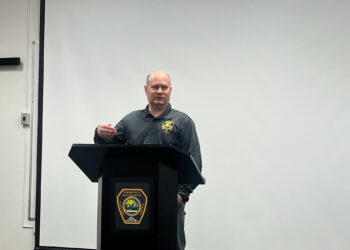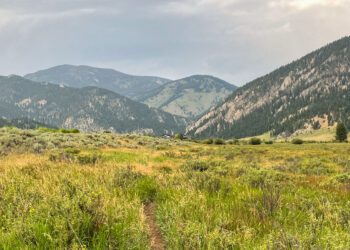The decision will allow APR to graze bison on 63,000 acres of BLM-administered land in Phillips County.
By Amanda Eggert MONTANA FREE PRESS
The Bureau of Land Management approved American Prairie Reserve’s application for grazing leases on 63,000 acres of BLM-administered land in Phillips County Thursday. The application process, which dates to 2018, drew intense public interest, in large part due to the animals included on the grazing leases: bison.
The application became a lightning rod for opinions about both bison and APR, which aims to conserve prairie species by acquiring large private parcels and connecting them with tracts of public land, thereby “creating the largest wildlife reserve of its kind in the lower 48 states.” That vision is largely funded by private investments. According to the most recent available financial statement on its website, the APR had $77 million in net assets in 2020.
BLM received 2,700 comments on its environmental analysis of APR’s proposal, which included renewal of two existing leases and the addition of four more. APR proposed changing the seasonal timing of grazing on some allotments and adding an electrified wire to some fences, along with other fence modifications. One allotment will be grazed by both APR bison and cattle owned by another lessee. The others will be bison-only leases.
“After shutting out public input from local communities, it’s not a surprise that President Biden’s Bureau of Land Management would rubber-stamp this radical proposal that is another step toward displacing northeast Montana’s livestock industry and replacing it with a large outdoor zoo.”
MONTANA ATTORNEY GENERAL AUSTIN KNUDSEN
Industry groups and elected officials who’ve been vocal about their frustrations with APR delivered swift and vigorous opposition to the approval, with at least three Republican elected office-holders forecasting continued opposition to the decision.
Gov. Greg Gianforte questioned whether BLM has “statutory authority” to enact the proposal In an emailed statement. In a tweet, Sen. Steve Daines called the approval “completely unreasonable” and representative of the Biden administration “ignoring input from [Montana] ranchers.” Daines said he will work with Gianforte’s office in the coming weeks to review the decision.
Montana Attorney General Austin Knudsen also criticized BLM’s approval process in an emailed statement.
“After shutting out public input from local communities, it’s not a surprise that President Biden’s Bureau of Land Management would rubber-stamp this radical proposal that is another step toward displacing northeast Montana’s livestock industry and replacing it with a large outdoor zoo,” Knudsen said.
Part of the critique alluded to by Gianforte, Daines and Knudsen is related to frustration about APR-adjacent lands transitioning away from agricultural production to more conservation or recreationally oriented uses. “Save the Cowboy, Stop the APR” signs have become common in Phillips County, and agriculture industry groups like the Montana Public Lands Council allege that BLM has demonstrated “preferential treatment to this specific permittee.”
BLM’s 48-page record of decision references the live wire underlying so much interest in the leasing decision: the relative rarity of bison grazing on allotments the agency manages. But it noted that bison grazing is permitted on other BLM allotments, both in-state and out-of-state. BLM administers leases in Colorado, New Mexico, North Dakota, South Dakota and Wyoming where bison grazing is permitted.
“Though the proposal to allow domestic indigenous livestock grazing conflicts with views and opinions expressed among some users of public lands, such unfavorable views of the proposal itself do not constitute a scientific controversy, disagreement about the nature of effects, or provide evidence that the project is not in conformance to BLM’s statutory and regulatory requirements,” the record of decision reads.
The decision also touches on how BLM anticipates bison grazing to interact with other flora and fauna, which was one of a handful of concerns flagged by the Montana Stockgrowers Association, including “impacts to the rangeland health, riparian areas and socioeconomic impacts to the rural communities and the livestock industry.”
“This decision is grounded in sound science, complies with all local, state and federal laws, and recognizes the important ways bison grazing has and will continue to improve rangeland health.”
AMERICAN PRAIRIE RESERVE CEO ALISON FOX
The agency referenced differing grazing habits between bison and cattle in the decision, arguing that since bison tend to graze in patches, their presence on the landscape supports “a patchy distribution of vegetation that encourages plant species diversity by allowing forbs [flowering plants] to flourish.”
“Species such as Greater Sage Grouse will benefit from an increase in native forbs,” the document continues. “Because bison tend to spend less time and forage greater distances from water, improvements to riparian vegetation and riparian function will also be seen. This will improve habitat conditions for aquatic and riparian wildlife species, such as amphibians and riparian birds, by increasing the availability of habitat features, such as canopy cover and nesting sites, due to increased riparian vegetation diversity and abundance.”
The application process started in 2018, when BLM initiated public scoping on APR’s proposal. Last July, BLM released an environmental assessment and took public comment over a 90-day period. It then issued a proposed grazing decision in March, which, it said, incorporated “several revisions” to its earlier analysis.
APR emphasized the process that preceded BLM’s decision in an emailed statement about the final decision.
“After four years of comprehensive analysis and public comment, we are extremely pleased the BLM has approved this grazing application,” APR CEO Alison Fox said. “This decision is grounded in sound science, complies with all local, state and federal laws, and recognizes the important ways bison grazing has and will continue to improve rangeland health.”
“American Prairie relies on voluntary land acquisition, cooperation, and private management — not regulation, taxpayer dollars, or federal land acquisitions. Everyone who respects landowner property rights should support this promising new model for conservation.”
JONATHAN WOOD, VICE PRESIDENT OF LAW AND POLICY AT THE PROPERTY AND ENVIRONMENTAL RESEARCH CENTER.
According to the group, the application approval will allow APR to expand its herd of bison by about 200 animals to approximately 1,000 animals in the next three years. “By comparison,” the email continues, “the majority of American Prairie’s land base is leased out to local cattle ranchers and supports over 10,000 head of cattle.”
In an emailed statement, Bozeman-based Property and Environmental Research Center vice president of law and policy Jonathan Wood went to bat for APR and its guiding model.
“This is not only the right decision legally, but it’s also the right way to approach conservation. American Prairie relies on voluntary land acquisition, cooperation, and private management — not regulation, taxpayer dollars, or federal land acquisitions,” Wood said. “Everyone who respects landowner property rights should support this promising new model for conservation.”
Per BLM rules, any applicant, permittee, lessee or other person “whose interest is adversely affected by the final decision” can file an appeal to the decision within 30 days of July 28.












